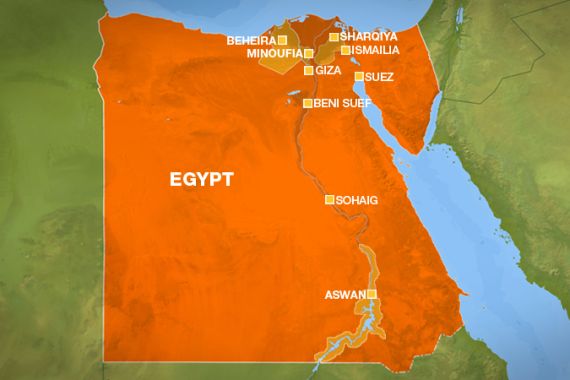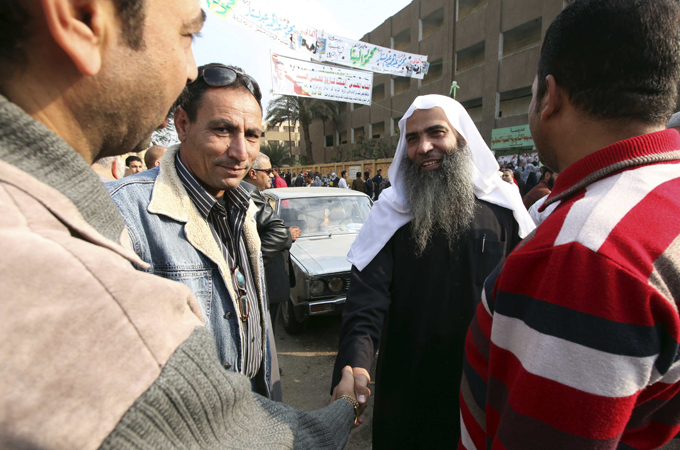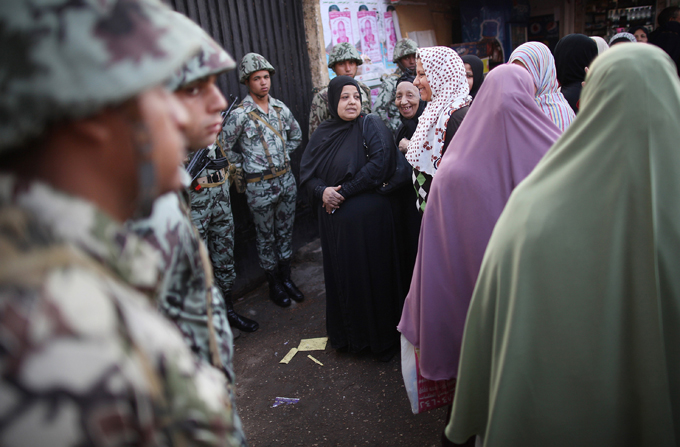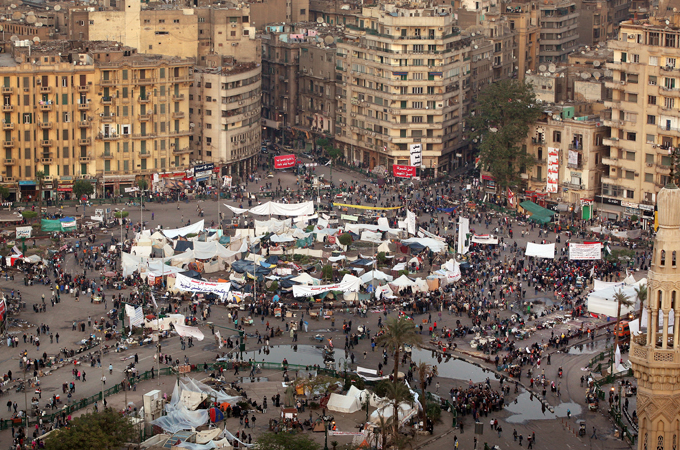Egypt political groups ready for round two
Liberals scramble to regroup as Salafis and the Muslim Brotherhood compete in the second round of parliamentary voting.

 |
|
Salafi Muslims from the Nour Party made the most surprising gains in the first round of voting [REUTERS] |
Egyptians are set for another democratic landmark on Wednesday when the country will hold a second round of parliamentary voting, part of the first elections since President Hosni Mubarak was ousted in February.
The government hailed the first round, held on November 28, saying voter turnout hit a record 52 per cent.
The second round will feature an entirely new cast of nine governorates whose residents will have their first chance to vote in a Mubarak-free Egypt. The voting will be centered in the Lower Egypt regions of the Nile Delta and Suez Canal, though two governorates in more tribal Upper Egypt – Sohaig and Aswan – will also participate.
A shift in the battlegrounds, however, does not signal a change in the battlelines. It still remains a struggle between Islamists and overmatched liberals, and within the Islamist movement itself.
On one hand, the Muslim Brotherhood’s Freedom and Justice Party (FJP) is poised to continue to dominate, while the comparatively secular and liberal Egyptian Bloc struggles to carve off a small slice of the People’s Assembly for itself. But the fundamentalist Salafi Nour Party, which finished second to the FJP in round one, will challenge the Brotherhood again.
The ascent of the Nour Party seemed to surprise almost everyone but the Salafis themselves, and the Brotherhood now finds itself fighting a conservative religious faction on its flank while it tries to assuage nervous liberals and Western governments.
Overshadowing the whole affair is the Supreme Council of the Armed Forces (SCAF), which has ruled Egypt after Mubarak and repeatedly suggested it prefers a toothless parliament, setting itself up for a tug of war with the country’s new political powerhouses.
The dark horse
Unheard of before the election, the Nour Party swept to victory on a platform light on policy prescriptions but heavy on religion.
Though Nour’s official platform calls for freedom of opinion and “full equality” between men and women, its electoral strength was tied less to political ideology than its religious popularity, social work and perception among supporters that it is a clean and honest heir to Egypt’s corrupt regime.
 |
| Salafis view Sawiris, the billionaire founder of the liberal Free Egyptians party, as an arch enemy [EPA] |
Nour’s rise immediately sparked fears among liberal Egyptians who worried that the political birth of the Salafis signalled a coming imposition of strict Islamic law, but the party bristles at what it sees as a piling-on of attackers.
“If there is a fall in voters, it’s because all the newspapers and television channels are campaigning against us, claiming we will ruin tourism,” said Mohamed el-Nour, a spokesperson for the party.
“People claim we think technology and science defy God, but that’s not true. We want to be up to date and modern, with a confined freedom where people can live free to express themselves within the limits of the Sunna and Sharia.”
Nour lashed out at Naguib Sawiris, the billionaire Christian telecom mogul who founded the liberal Free Egyptians Party and is one of the architects behind the Egyptian Bloc.
The bloc “is constantly spreading misinformation about us,” Nour said. “It’s not fair, because he has money and we don’t.”
Sawiris, for his part, has accused the Salafis of recieving foreign funding from Gulf countries, which Nour denied, suggesting his party was considering suing Sawiris over the allegation.
Though final election results will not be released until January, when the three stages of voting for the assembly are finished, the Nour Party is estimated to have won 31 of the 168 seats up for vote in the first round.
Mubarak’s regime allowed Salafis to operate freely in comparison to the Brotherhood, running official satellite channels and preaching openly in mosques, because the ultra-conservative groups typically disavowed politics and represented a non-political counterweight to the more activist Brotherhood.
Recent polls have shown the Salafis gaining more likely voters, and Nour said the party had learned from its “mistakes” in round one.
“We’re not worried about our voters because they know us and they believe in what we say,” he said. “We’re very hopeful about round two.”
The moderate trend
The Nour Party’s impressive showing shocked even the Brotherhood, which is still widely expected to dominate the election and is estimated to have won 80 seats, nearly half of those available, in the first round.
“We, like other parties, were surprised by the votes the Salafis got … which in our opinion is very high for a party that is politically inexperienced,” said Sondos Asem, a spokesperson for the FJP.
Asem said she didn’t think Salafis would perform as well in the second round but that the Brotherhood had a responsibility to reach out to “poor areas” where fundamentalist teachings hold greater sway.
“The vast majority of Egyptians are religiously conservative but moderate,” she said. “People will be attracted to more moderate Islamic trend.”
The evidence supports Asem’s view, to a point. The most straightforward evidence of voters’ sympathies, a government tally of the popular vote for party lists, shows the FJP with a commanding 37 per cent but the Nour Party, with 24 per cent, not far behind.
Asem acknowledged that the result was “a bit less” than what the FJP expected, but she argued that Salafis and liberals benefited from the geography of the first round. The Nour Party – which was founded in Alexandria – is strong in Damietta and Kafr el-Sheikh, while the Egyptian Bloc is popular in Cairo, she said, listing first-round governorates.
 |
| The military is in a tug of war with Islamists who want to ensure powers for parliament [GALLO/GETTY] |
The FJP’s popular mandate may put it on a collision course with the military, whose generals have repeatedly stated that they would like to see a tame parliament whose powers to shape Egypt’s new government and constitution will be constrained if not completely controlled by the Supreme Council of the Armed Forces.
Political figures from Sawiris to Emad Abdel Ghafour, the head of the Nour Party, have joined a military-sponsored “advisory council” to oversee the selection of the body that will draft the constitution, but the FJP has refused to participate.
Pressure from the Brotherhood, which has shown it can rally hundreds of thousands of protesters on the street, will likely force the military to negotiate, and on Sunday a general retreated from earlier statements that parliament would not be able to choose the 100-member constituent assembly.
“Our position is totally against military interference,” Asem said. “There should be a very clear stance against military intervention in the upcoming political transition, and those parties, if they really are serious and honest about their democratic aspirations, should not ally with the military just because they have political biases against the Brotherhood.”
‘Following the rules will not make us win’
Despite Asem’s warning, Egypt’s liberals are searching for allies, as well as new strategies, in their attempt to stay competitive in the second round.
One option circulating among political organisers is an alliance called the Positive Movement, which would combine almost the entire liberal and leftist spectrum in an effort to counterbalance the Islamists.
The movement has the backing of the Egyptian Bloc but remains more theoretical than practical and reportedly has been rejected by the Revolution Continues Alliance, a small but influential coalition of socialists, Tahrir Square activists and breakaway Brotherhood youth that won an estimated four seats in round one.
The point of contention is said to be the bloc’s willingness to work with former regime figures – popularly called “felool,” or remnants – but it is that kind of political realism that may help liberals and secularists win more seats in the coming vote.
“There were discoveries on all levels in phase one,” said Moushira Saleh, the bloc’s campaign supervisor in Alexandria.
 |
| As protests dwindle in Tahrir Square, Egypt’s liberals have found they need to play politics to win [GALLO/GETTY] |
The bloc needs to increase its door-to-door campaigning, establish a forceful presence outside polling stations on election day, and assign lawyers and party workers with cameras inside each station to immediately document suspicious events, Saleh said.
She said the Islamists had outdone the bloc, campaigning more effectively and influencing election judges. Salafi and FJP complaints had forced recounts in two districts in Alexandria, she recalled, leading to 35 ballot boxes being nullified in one district where the bloc’s vote count dropped from an estimated 100,000 to 13,000 votes.
The bloc filed multiple complaints, and a court order suspended the results from one district of Alexandria where two FJP candidates won. The incident involving the 35 ballot boxes was still under investigation, Saleh said.
She said it was crucial to assign lawyers “who are familiar with dirty tricks, because judges don’t respond unless you’re aggressive and strong with supporters.”
“The more noise you make, the more you’re heard, because you can say, ‘I’ve got my people outside’ … This is how FJP and Nour were influencing the judges,” she said.
The bloc plans to campaign openly in front of polling stations up to and including election day, despite a widely reported ban on such activity and vocal liberal complaints about the FJP doing so to great effect during round one.
Saleh said judges told the bloc that election “bylaws” actually make such campaigning legal. Such an opportunity can’t be wasted, she said.
“A huge amount of voters went out and were indecisive, didn’t know what to do or who to vote for … [and were] standing in line knowing nothing, whether about the process or the candidate, and this is the moment where we can take them to our side,” she said. “We found that following the rules will not make us win.”
With additional reporting by Ragia Mostafa